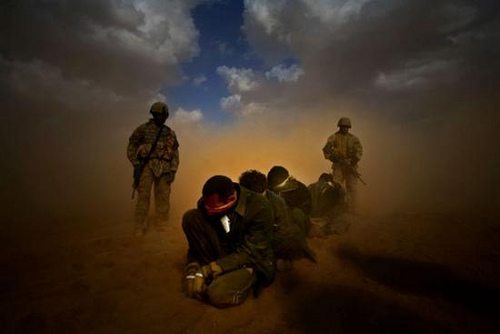As the war in Afghanistan enters its 10th year the US military is shaking up its traditional training regimen to prepare troops for the country’s complex battlefields.
At boot camps nowadays soldiers are taught to think on their toes as they prepare for missions that will require them not only to fight shadowy enemies on rough terrain but also protect civilians caught in the crossfire.
“Thirty years ago it was blind obedience. Today we teach them to think,” says Command Sergeant Major John Calpena, who honed his skills during a 29-year-long career, including on deployments to Iraq.
“We expect them to think. We force them to make a decision under stress.”
First aid courses now teach soldiers to make tourniquets from scratch, while the traditional black and white bull’s-eyes at shooting ranges have been replaced by moving targets, some which are not to be shot.
Command Sergeant Major Richard Weik, who just returned from a rotation in Afghanistan’s Paktika province, watched as the soldiers navigated the revamped firing range here at Fort Benning in the southeastern state of Georgia.
“Most of these guys within a year will be somewhere on a theater,” he said, with Afghanistan the most likely destination following US President Barack Obama’s decision over a year ago to flood 30,000 troop reinforcements into the war-torn country.
Posted with a gun behind the window of a plywood shed used for urban combat training, Private Antuan Lecounte is preparing for the murky battlefields to which he may soon be deployed.
“If you see a uniform, you know what to do. If you see someone using a cell phone, you don’t know if he’s going to detonate a bomb or say to his wife ‘I love you,'” he says, following 12 weeks of training.
Specialist Dan Zaborowski, 27, has also noticed the changes since his first stint in the army seven years ago.
“They’re constantly hardening on integrity. There is more emphasis on teaching rather than disciplining.”
The soldiers’ physical training has also been revised to better match the demands of combat, with fewer push-ups and sit-ups, says Lieutenant General Mark Hertling of the army’s training and doctrine command.
“It’s linked directly to the kind of things we expect the soldier to do on the battlefield — short burst of energy, carrying heavy loads,” he says.
It’s the kind of training that, among other things, will prepare the soldiers to carry wounded comrades to safety.
“I’ve been on the battlefield for three years in my life. I’ve never done a two-mile run on the battlefield, but a lot of short bursts,” Hertling said.
The morning workout saw some 200 soldiers mix sprints and gymnastics, exercises designed to strengthen their muscles and prevent injuries.
The scene would not be out of place in a neighborhood gymnasium, but here the soldiers were planted in the mud.










